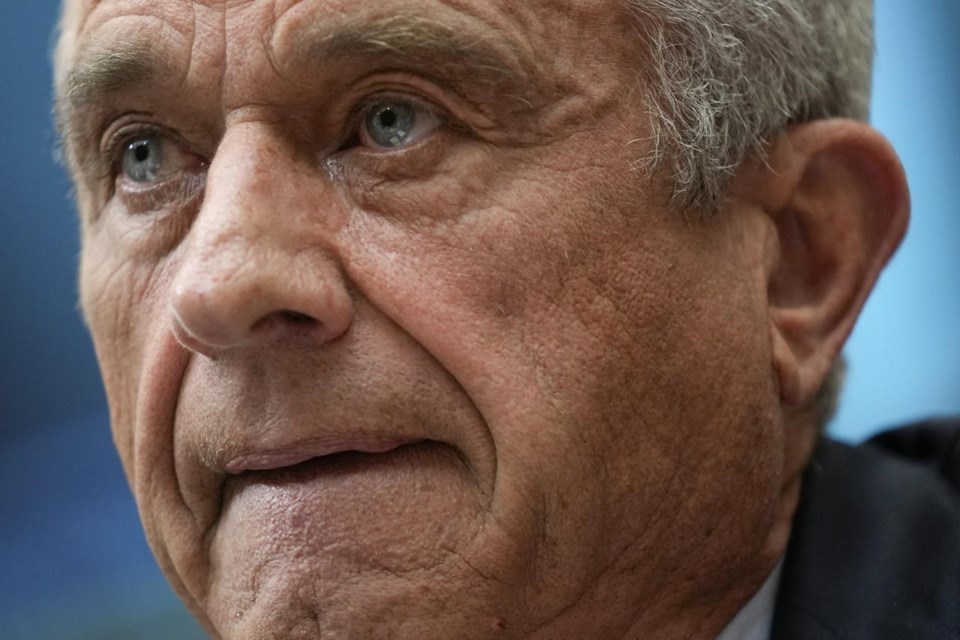WASHINGTON (AP) — Robert F. Kennedy Jr. defended himself Thursday against accusations that he traffics in racist and hateful online conspiracy theories, testifying at a House hearing on government censorship despite requests from outside groups to disinvite the Democratic presidential candidate after his recent antisemitic remarks.
The Republican-led Select Subcommittee on the Weaponization of the Federal Government is amplifying GOP claims that conservatives and others are being unfairly targeted by technology companies that routinely work with the government to try to stem the spread of disinformation online.
In opening remarks, Kennedy invoked his famous family’s legacy in decrying the complaints of racism and antisemitism against him.
“This is an attempt to censor a censorship hearing,” said Kennedy, the son of Roberts F. Kennedy and the nephew of President John F. Kennedy.
Kennedy defended his social media posts, which have delved into race, vaccine safety and other issues, as neither “racist or antisemitic.” He said his family has long believed in the First Amendment right to free speech.
“The First Amendment was not written for easy speech,” Kennedy said. “It was a speech that nobody likes you for.”
Republicans are eager to elevate Kennedy after he announced in April he was mounting a long-shot Democratic primary challenge to President Joe Biden. Kennedy’s presidential campaign chairman, Dennis Kucinich, the former congressman and past presidential contender, sat in the front row behind him.
The Big Tech companies have adamantly denied the GOP assertions and say they enforce their rules impartially for everyone regardless of ideology or political affiliation. And researchers have not found widespread evidence that social media companies are biased against conservative news, posts or materials.
The top Democrat on the House panel, Del. Stacey Plaskett of the Virgin Islands, said the Republican majority was giving a platform to Kennedy and others to promote conspiracy theories and a rallying cry for “bigotry and hate.”
“This is not the kind of free speech I know,” Plaskett said.
The hearing comes after a federal judge recently sought to halt the Biden administration from working with the social media companies to monitor misinformation and other online postings. An appellate court temporarily paused the order.
The panel’s chairman Rep. Jim Jordan, R-Ohio, stood by the decision to have Kennedy testify. In his own opening remarks, Jordan portrayed what he claimed were examples of censorship, including a White House request to Twitter to remove a race-based post from Kennedy about COVID-19 vaccines.
“It’s why Mr. Kennedy is running for president — to help us expose and stop what’s going on,” Jordan said.
A watchdog group asked Jordan to drop the invitation to Kennedy after he suggested COVID-19 could have been “ethnically targeted” to spare Ashkenazi Jews and Chinese people.
In those filmed remarks first published by The New York Post, Kennedy said “there is an argument” that COVID-19 “is ethnically targeted” and that it “attacks certain races disproportionately.”
After the video was made public, Kennedy posted on Twitter that his words were twisted and denied ever suggesting that COVID-19 was deliberately engineered to spare Jewish people. He called for the Post’s article to be retracted.
But Kennedy has a history of comparing vaccines — widely credited with saving millions of lives — with the genocide of the Holocaust during Nazi Germany, comments for which he has sometimes apologized.
An organization that Kennedy founded, Children’s Health Defense, currently has a lawsuit pending against a number of news organizations, among them The Associated Press, accusing them of violating antitrust laws by taking action to identify misinformation, including about COVID-19 and COVID-19 vaccines.
Jordan said that while he disagreed with Kennedy's remarks, he was not about to drop him from the panel. Speaker Kevin McCarthy took a similar view, saying he did not want to censor Kennedy.
Ahead of the hearing, Democratic Rep. Gerry Connolly of Virginia said Kennedy holds “vile” beliefs. “By promoting Mr. Kennedy, Republicans are deliberately providing a platform to amplify hate speech,” he said.
The panel wants to probe the way the federal government works with technology companies to flag postings that contain false information or downright lies. Hanging over the debate is part of federal communications law, Section 230, which shields technology companies like Twitter and Facebook from liability over what's said on their platforms.
Lawmakers on the panel wereare also hearing testimony from Emma-Jo Morris, journalist at Breitbart News, who has reported extensively on Biden's son, Hunter Biden; and D. John Sauer, a former Solicitor General in Missouri who is now a special Assistant Attorney General at the Louisiana Department of Justice involved in the lawsuit against the Biden administration.
Morris tweeted part of her opening remarks in which she described an “elaborate censorship conspiracy" that she claimed sought to halt her reporting of Hunter Biden.
Another witness, Maya Wiley, the president and CEO of the Leadership Conference on Civil and Human Rights, strayed from her prepared remarks to implore the lawmakers to consider how important it is to have platforms where Americans can share views — but also “how deeply vital that they be based in fact, not fiction.”
The U.S. has been hesitant to regulate the social media giants, even as outside groups warn of the rise of hate speech and misinformation that can be erosive to civil society.
___ The Associated Press receives support from several private foundations to enhance its explanatory coverage of elections and democracy. See more about AP’s democracy initiative here. The AP is solely responsible for all content.
Lisa Mascaro And Ali Swenson, The Associated Press



